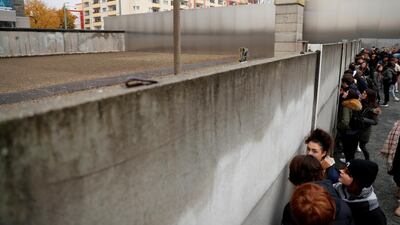Not far from the geographic heart of Germany, the town of Erfurt is back in the national spotlight for the first time in 30 years.
As the events of 1989 led up to the fall of the Berlin Wall, the anniversary of which is being marked on Saturday, Erfurt was one of the leading hubs of the protest movement in the former East Germany.
Demonstrations have again been seen on its streets this year as neo-fascists and extreme right politicians mobilised against the construction of a mosque in the town. Although the authorities have given permission for the building, the protests emerged amid a growth in anti-Muslim activism centred on the former eastern Germany.
Bjorn Hocke, a regional political, who led the protests called for 2020 to be the “year of deportation”, claiming it would give a boost to the “underutilised” Erfurt airport. He promised to be at the gates for the "at the first deportation flight, waving and calling out for a good trip home".
The comments caused outrage but boosted Mr Hocke’s career. In regional elections last month he led his Alternative for Deutschland (AFD) party to second place with 23 per cent of the vote.
To Suleman Malik, the imam behind the much delayed mosque project, the comments are part of a wave of death threats and harassment, including deliveries of pigs heads to the building site. Islamphobia is real in Erfurt and the wider state of Thuringia, where 7,000 Muslims live in a 2 million population.
“Thuringia is my home and I am not going to leave it because of the far-right,” Mr Malik told foreign journalists. “I will not give up my house to those who want to divide us.”
Mr Malik directly accused Mr Hoche of leading a revival of fascism and cultivating a climate of hate directed at minorities. “Murder is only the most extreme end of a chain of violence that begins with verbal aggression,” he added. “This turns into insults, continues with attacks and material damage to property before the ultimate self-satisfaction from the death of the other.”

The Berlin Wall is now remembered as a national scar that split the German homeland. Erfurt was just about as far West as it was possible to travel in the former Eastern Germany.
In 1970 it was chosen as the venue for the groundbreaking meeting of the leaders of the two German states, Walter Ulbrecht and Wily Brandt. Within two years, Mr Brandt’s Ostpolitik or normalisation policy with the east, led to mutual recognition and an exchange of ambassadors in 1972.
Nonetheless rivalry remained frozen until 1989 when the easterners saw their chance to rise up against the Communist regime. Edelbert Richter, a protestant preacher, formed the Democratic Rising party calling for free elections in Erfurt, making the town a centre of revolt.
Egon Krenz, the new eastern leader, could no longer hold the line and by November 9 all border controls were dropped. The people of Erfurt were among the first to flood into the west.
Civil rights activist Barbara Sengewald did not join the exodus but with a group of activists rushed to secure the secret files of East Germany’s fear Stasi, the secret police. She explained the idealism of the times as the citizens celebrated the end of the oppressive Communist regime.
“We wanted to eliminate the apparatus of power an create a society of justice and solidarity,” she recalled. “There were so many who overcame their fears to make a change.
“There were old pensioners with militia armbands and young women with babies in their arms. It was a revolutionary time, unthinkable today.”
The reunifaction of Germany in December 1990 tied the east to the prosperous West but for many the post-Communist period was a painful experience. Despite an estimated two trillion euros in West-East transfers, four in five easterners ended up unemployed at some point. Alienation and resentment in the east is now fuelling the rise of extremist politics.
Polling by the Pew Research Centre ahead of the reunification anniversary found that 24 per cent of adults in the old east had a favourable view of the AFD, compared to just 12 per cent in the west. While majorities on both sides had favourable views of Muslims, more than 36 per cent of easterners expressed unfavourable opinions, compared to 22 per cent of westerners.
Across the former eastern bloc polling shows distrust of the post-1989 settlement has grown. Democratic institutions have been undermined and the rule of law is increasingly questioned. Hostility to minorities on the rise, something that spiked after 2015 and the influx of refugees to Europe from Syria and Iraq. An Open Society poll of seven central European countries, including Germany, found that between 61 per cent and 51 per cent of respondents agreed that democracy was under threat.


